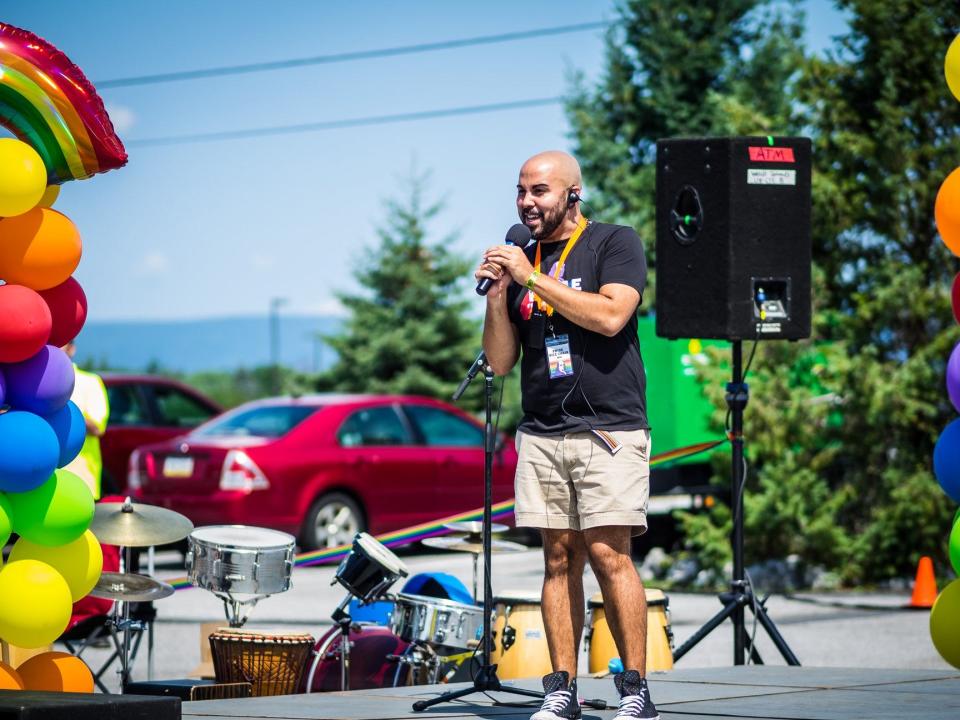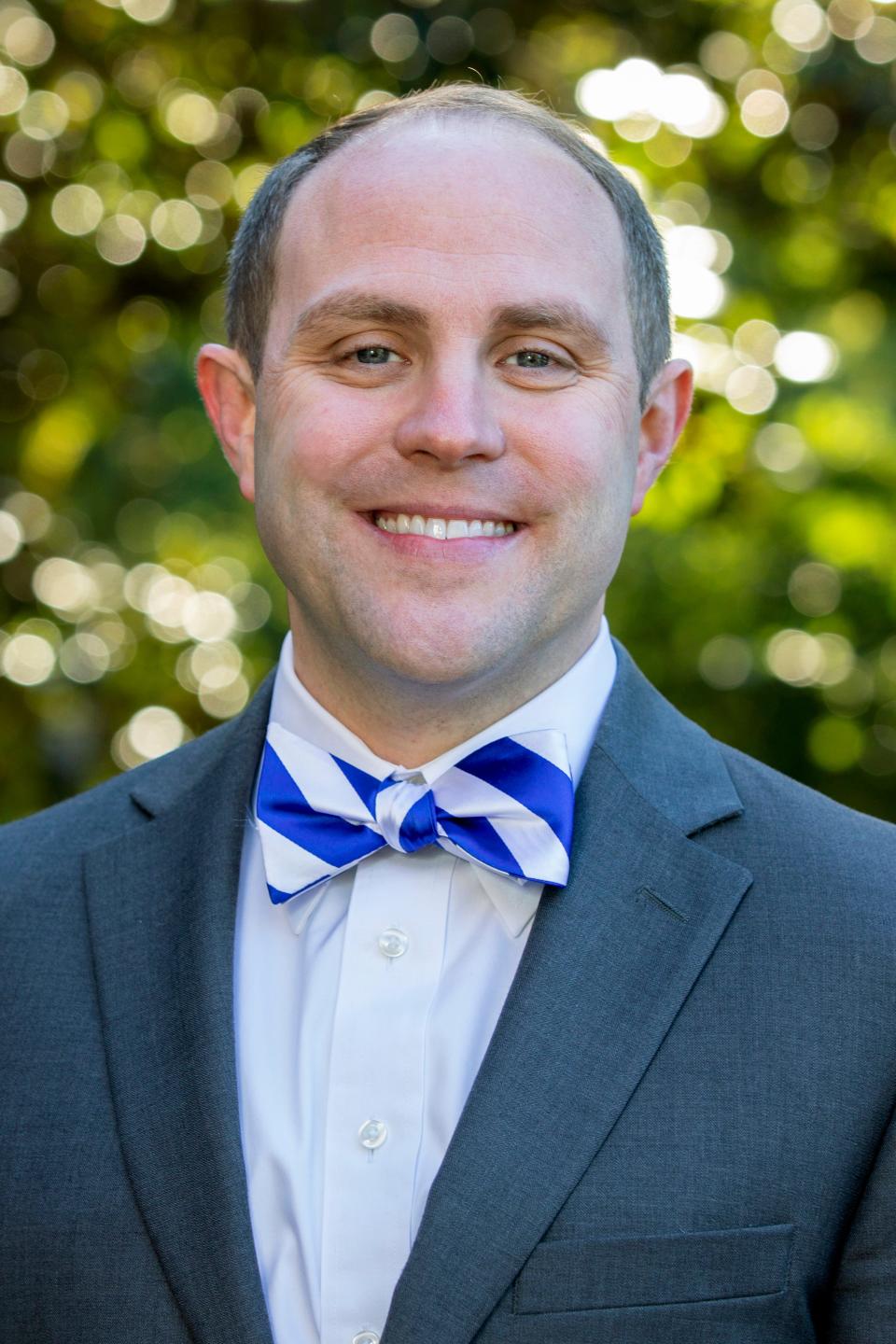Gay in a small town: Life has improved for LGTBQ in central Pa., but fear persists at times
Schools in central Pennsylvania have elected gay prom kings, and people in the LGBTQ community hold prominent roles in communities.
But some gay men dare not hold their partner's hand in public. A nonbinary person expects to be stared at. A transgender woman worries about conservative lawmakers turning back the clock of progress.
In Pennsylvania and around the country, more people than ever are proudly living as their authentic selves - a Gallup poll published earlier this year showed a record 5.6% of adults identify as LGBTQ. But many people who are gay, bisexual, transgender, non-binary, gender fluid, or otherwise not heterosexual and cisgender still experience discrimination and judgment.
Ranges from in-the-closet to confident
Phillip Whitley has known he was gay - and "phabulous," as his business motto goes - for as long as he can remember.
The Chambersburg native was obsessed with Prince Eric from "The Little Mermaid" and had a crush on Uncle Jessie from "Full House." But he quickly learned that his devoutly religious and conservative adoptive parents had zero tolerance for that sort of thing.
That attitude followed him into the classroom. Toning down who he was, such as his feminine voice and mannerisms, was a "survival" mechanism.
"I remember my first day of public school (in first grade), everyone asking why I sounded like a girl. That was the prerequisite telling of what school was going to be like," Whitley said.
He came out to his parents shortly before turning 18. They kicked him out and cut him off financially, calling his lifestyle "a detriment to (their) faith."

Having grown up sheltered and spoiled, learning how to live on his own was traumatic.
But at the same time, he felt freedom he never knew existed. Friends, and even their parents, rallied around him.
The experience kickstarted a journey of discovery, and today at age 32 Whitley makes a living from his passion of photography and holds leadership positions with local organizations, including as chair of the United Way of Franklin County's annual fundraising campaign and as a cofounder of Pride Franklin County.
"I think having opportunities to be in leadership positions like that is amazing because it gives me an opportunity to be an out and proud person," Whitley said.
Going through school was a struggle as well for Kevin "Kev" Hernandez, 30, and siblings Brandon and Christian Riojas. They also grew up in Chambersburg, but have moved elsewhere in Pennsylvania and beyond after high school.
Hernandez, who now lives in Philadelphia, said keeping differences in sexual orientation and gender identity a secret was pretty much necessary for kids and teens in the '90s and early 2000s. He knew of only a few other guys - no girls - in his high school who were gay.
More: Donations flood Pa. library after elected officials call LGBTQ community there a hate group
While he didn't go through any serious bullying, he was depressed and struggled to do well in school as a result of trying to keep his true self hidden. He didn't realize the connection until he was an adult.
"When you're so young and believe that who you are is wrong, it consumes you," Hernandez said.
The Riojas siblings grew up in a religious household with parents who enforced gender constructs and taught them that crushes on people of the same sex were wrong. They hid their true selves at school for fear of bullying.
Brandon, 26, said he was surprised when he came out to his mother as gay after a year away at college and she said she always knew and would accept him, although she didn't agree with it for religious reasons.
Christian, 24, was assigned male at birth but now identifies as non-binary, uses both he/him and she/her pronouns and is attracted to men. He moved to New York City at 21, where he started growing his hair out, wearing makeup and wearing nails - although he dresses in men's clothes sometimes, too.
"The person I was molded into thinking I was supposed to be when I was younger is not the person that I am," he said.
Local leaders lead the way
Wesley Fugate and Bryan Tate both hold prominent roles in their communities. Both come from small towns in rural areas and grew up in tight-knit families. Both have been involved in Republican politics in Washington D.C.

They are also gay. Both men came out in adulthood, Tate in his early 30s and Fugate at age 28.
Tate, 54, holds elected office in York County, as the register of wills and clerk of orphans' courts.
"I was endorsed by the Republican Party. That tells me that folks are open-minded," he said. "Someone's sexual orientation isn't the driving factor; people's qualifications and what they bring to the table and how they embrace their community, those are all things that are important in representing folks in government."
Fugate, 41, is the president of Wilson College in Chambersburg.
"A college presidency is very unique. Is this a campus community and an alumni community and a local community that will accept me? If they won't, I don't need to come, that's not good for the institution and it's not good for me.
"When I asked that question about Wilson, there was no hesitation: 'yes, absolutely (we will accept you).'"

Tate and Fugate are also similar in that experiences on college campuses made them confident enough to come out. After graduating from Spring Grove High School in 1985, Tate discovered a whole new world in Philadelphia, where he attended Temple University. His time there put him on a path of growth toward coming out a decade later.
Fugate was working at the University of Georgia when he met the man who would become his husband. After struggling in private for years and trying to reject thoughts that he was not straight, being a part of that progressive college community of 30-some thousand students was the push he needed.
New report: There could be twice as many LGBT adults in US as earlier estimated
Stand-: LGBTQ people in need of stand-in parents at weddings, holidays find 'family' in Facebook group
'I've accepted I'm someone who turns heads'
While Whitley and others in Pennsylvania's LGBTQ community feel confident these days being out and proud in their communities, some still don't feel safe enough to show their partners affection in public.
"Can I hold my partner of 11 years' hand as I walk down Main Street?" Whitley asked. "Absolutely, but I'm aware there are consequences. And a lot of the time those consequences are not worth it."
Fugate knows all about that. While he and his husband made the choice early on to never show public displays of affection, hateful and threatening comments on a Facebook post announcing his hiring at Wilson College made it clear that rule should stay put.
Both Riojas siblings say they have been discriminated against by businesses.
A bouncer refused to let Brandon and his boyfriend into a bar in Harrisburg, even though people were let in before and after them. They also do not go to diners anymore after several incidents of poor treatment.
Christian had a bad experience at one of his first jobs. He was a server at a restaurant, and a customer demanded someone new, saying they "didn't want anyone like that" serving them.
He has taught himself to not let it bother him, but Christian said he just expects that people will stare at him.
"I tell myself you can't get angry when people stare," he said. "I may be the most interesting thing they might see today. If they're staring at me, it might be in admiration. I've accepted I'm someone who turns heads."
Changing times: More Americans understand LGBTQ people, but visibility has 'double-edged sword', GLAAD report says
Evolution and the next generation
Social media has changed things for the LGBTQ community.
"I grew up with a flip phone and AOL messenger. Even if there were other gay people, you didn't know them," Christian Riojas said. "You were stuck in your small town and you only know one gay person in your small town. ... Now with social media it gives people the confidence to post a picture or status and reflect on their gender online. Thousands can see that in seconds. It helps awareness, it helps them be confident."
The internet has, in particular, helped the transgender and non-binary community, according to Joanne Carroll, the executive director of Trans Advocacy Pennsylvania.
Assigned male at birth, the 81-year-old transitioned to a woman later in life, at age 60. Since age 4 or 5, she did not feel like the boy people perceived her to be, but there was no language back then to describe what she was feeling.
She spent years trying to find answers in books and struggling in silence.
"The internet brought chatrooms. You could talk to others dealing with it," she said. "It does make a difference."
Hernandez, Whitley and the Riojas siblings all shared stories of how, although they still see discrimination and judgment, they have felt a shift in how they are treated in central Pa. Christian Riojas has noticed that people are less inclined to speak out against others they perceive as different or weird.
It is nobody's job to try to convince someone else of anything, Tate said. All he and others can do is try to be positive examples.
"If people take the opportunity to understand how everybody's different, to understand differences between gender and sexual orientation and identities and all of these different diversities," Tate said, "I think people will be much more understanding and empathetic toward others and realize that there's value in what everybody brings to the table."
The LGBTQ community may be more prominent than ever but there is still work to be done, Carroll said. Even though she feels fortunate in that most of her family, including her mother, supported her transition and that she passes as a woman, she knows most gender-non-conforming people and others in the LGBTQ community don't have it as easy.
"We haven't evolved very much. In the four years of Donald Trump, we devolved and continue to do so," Carroll said.
She pointed to bills that would prohibit transgender girls and women from participating in female sports and other efforts that lawmakers have taken to reverse course.
"I'm not saying we've turned the clock back entirely," Carroll said, pointing to Rachel Levine, the United States' assistant secretary for health and the first openly transgender person to be confirmed by the U.S. Senate. "We've obviously made some strides but the problem is we have this group of evangelical conservatives...doing their dead-level best to turn the clock back."
Amber South can be reached at asouth@publicopinionnews.com.
This article originally appeared on Chambersburg Public Opinion: LGBTQ acceptance increases in small towns Pennsylvania

